Cellists, pianist with hearts for interpretation lend their gifts during chapel worship
by Mike Ferguson | Presbyterian News Service

From left, Dr. William McConnell, Jason Raff and the Rev. Dr. Paul Huh play Wednesday during worship at the Presbyterian Center in Louisville. (Photo by Tammy Warren)
LOUISVILLE — It’s only fitting that Jason H. Raff would make his public debut in the Chapel at the Presbyterian Center in Louisville helping to interpret music alongside two other gifted musicians.
Raff is, after all, the new Global Language Resources manager for the Presbyterian Church (U.S.A.)’s Administrative Services Group. During Wednesday worship, he and fellow cellist the Rev. Dr. Paul J. Huh, an associate for translation, joined Dr. William McConnell, Mission Engagement advisor in the South region and himself a nifty pianist.
“It may be a cliché, but music is a universal language,” Raff said following worship. “I’ve had experience playing with people whose language I didn’t speak and who didn’t speak English or Spanish (Raff’s languages). But when the passion and the spirit are there, you find a way to communicate through your music. It’s a way for people of different walks to unite and do something together — because of or in spite of their differences.”

The Rev. Dr. Paul J. Huh plays his cello during Wednesday worship at the Chapel in the Presbyterian Center. (Photo by Tammy Warren)
Calling Wednesday’s worship service “The Art of Interpretation,” Huh said the intent for the 40-minute contemplative service was for worshipers to “get a hint of what our work involves through the music we play.”
If Wednesday’s service is any indication, translators’ work is both varied and challenging.
McConnell asked worshipers to open their Glory to God hymnals to number 108, “Of the Father’s Love Begotten.” The tune, DIVINUM MYSTERIUM, is “the oldest one in the book,” McConnell said, dating back to the fifth century. McConnell took worshipers through “a little journey of what if” by first singing the hymn’s first verse unaccompanied and in Latin — the way it was first done. He proceeded to bring the ancient hymn right up to the present, playing it in the manner Johann Sebastian Bach, Wolfgang Amadeus Mozart, Claude Debussy — even Dave Brubeck — might have played it.

Dr. William McConnell started with a 5th-century version of “Of the Father’s Love Begotten” and took it through the centuries for worshipers in the Chapel at the Presbyterian Center. (Photo by Tammy Warren)
“I add things music historians would turn up their noses at,” he said with a grin. “Really, it’s all a matter of interpretation.”
Huh and Raff played the “Sarabande” and “Prelude” to Bach’s Unaccompanied Cello Suite #1 in C Major. Later, McConnell joined the cellists to play both the “Allegro” and “Adagio” portions of Antonio Vivaldi’s Concerto in G minor for Two Cellos and Piano.
In between, the three played “Amazing Grace with Bach” as arranged by Sun Ahn.
Following worship, Raff, who began his new work last month, said that language access “plays a huge role” as Presbyterians seek to grow their ranks. Translation currently occurs in two languages — Spanish and Korean.

Jason Raff, the new Global Language Resources manager, speaks to his colleagues at the Presbyterian Center Wednesday following worship. (Photo by Tammy Warren)
“The more accessible we make our communications — written and spoken — to non-English language groups, the more people you are able to reach with God’s message through the Presbyterian Church,” he said. “We want to position the notion of language access to being one of a spiritual mission in terms of how we do our visioning.”
“From a high-level viewpoint,” he said, “we see it as a spiritual task to communicate and get to know one another — and through knowing one another, getting to know God.”
One of Raff’s inspirations is even older than McConnell’s 5th-century hymn: It’s the story of the Tower of Babel found in Genesis 11:1-9.
“God confuses the languages of humankind but doesn’t take away our ability to learn each other’s languages,” Raff said. “If God didn’t want us communicate, God would have taken that extra step. It was a challenge to unite us in spite of our confusing languages.”
![]() You may freely reuse and distribute this article in its entirety for non-commercial purposes in any medium. Please include author attribution, photography credits, and a link to the original article. This work is licensed under a Creative Commons Attribution-NonCommercial-NoDeratives 4.0 International License.
You may freely reuse and distribute this article in its entirety for non-commercial purposes in any medium. Please include author attribution, photography credits, and a link to the original article. This work is licensed under a Creative Commons Attribution-NonCommercial-NoDeratives 4.0 International License.